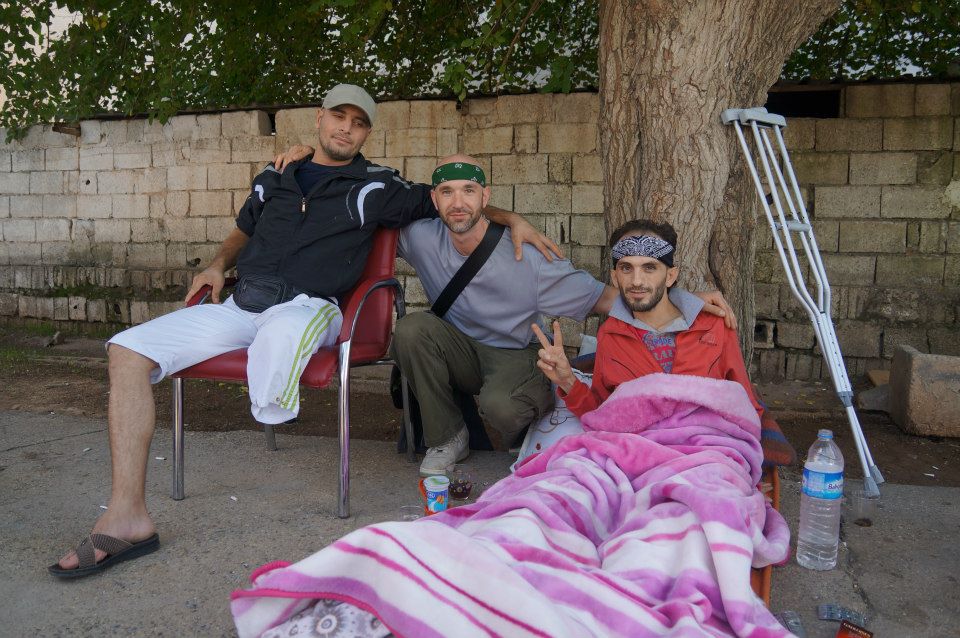A U.S. photojournalist kidnapped and tortured by al-Qaida in Syria in 2012 laments in a new book that the RCMP has still not arrested any of the Canadians who were allegedly involved.

In The Dawn Prayer, or How to Survive in a Secret Syrian Terrorist Prison: A Memoir, Matthew Schrier writes about “the Canadian connection” to the seven months he was held captive in Aleppo.
A month into his kidnapping, he was brought before three Canadian-sounding jihadists who wanted his online passwords. His credit cards were subsequently used to make thousands of dollars worth of purchases.
Some of the items were delivered to an address in Montreal. Schrier believes one of the suspects bought the goods using his real name, which he learned from his credit card records.
But almost five years later, no charges have been laid.
“That terrorist has since moved back to Canada where he lives a free man, having never been arrested or punished in any way for his role in the crimes committed against me,” Schrier wrote.
The RCMP said the matter was still under investigation. “So there’s nothing we can really share on it yet,” said Camille Habel, an RCMP spokesperson in Montreal. “It’s an active investigation.”
The government has said it was aware of about 60 extremists who had returned to Canada after having been active in terrorist groups abroad, but few have been charged. Another 190 remain overseas, about half of them in Syria, Iraq and Turkey.
The kidnapping of journalists became rampant in Syria following the outbreak of civil war, both for ransoms and propaganda purposes. A freelancer, Schrier was abducted early in the conflict, on Dec. 31, 2012.
His captors wanted to use his credit cards and empty his bank accounts. To this end, three English-speaking jihadists were brought in. They wore masks but Schrier said he recognized their Quebec accents.
“The three of them asked me some basic questions about who I was and explained that they’d been brought into the process due to the language barrier,” Schrier wrote in his book.
He was given a pen and paper and told to write down the passwords for his email, Facebook, bank and credit card accounts. Three days later, they summoned him again.
WATCH: What should you do if someone tries to kidnap you?

“None of the passwords worked,” he was told.
This time they gave him a laptop and told him to log into his bank and credit card accounts.
Tortured and starved, Schrier escaped through a damaged basement window after seven months. He returned to the United States to find the kidnappers had made US$17,000 worth of purchases with his credit cards.
The shopping spree included laptops, tablets, car parts, sunglasses, cologne and iTunes downloads. The items had been sent to Turkey but two of the orders named addresses in Montreal.
The RCMP executed search warrants at the homes of six Quebecers in 2015 in relation to the investigation, La Presse has reported. The warrant applications accused them of fraud, extortion and kidnapping.
National security investigators brought Schrier to Montreal and played him a wiretap of one of the suspects admitting he did it, Schrier told Global News in an interview.
WATCH: Kidnap victims should look for chances to escape but take care of their health, says Andy Ellis, a former CSIS officer.

The evidence amassed by the RCMP also includes devices seized from the suspects’ homes that were purchased with his money, emails, text messages, a positive photo identification of a suspect and a credible witness in Schrier, he said.
Asked if he was frustrated at the RCMP over the lack of charges, he said: “No, I was frustrated because it took them so long but I do believe they did their jobs well enough to convict these people and the Crown will not move forward.”
Schrier wrote in his book that the FBI had told him they already had two in custody. “Over four years have passed, and not one of the Canadians in custody has been put before me for identification, much less indicted or extradited to Canada.”
He believes the FBI was likely letting the jihadists “steal my money so that they could then intercept the laptops and tablets before delivering them directly into the hands of al-Qaida, creating the intelligence community’s wet dream for infiltrating the enemy.”
The FBI said its investigation remained open.
“We continue to work with our inter-agency and international law enforcement partners to gather intelligence and assess the possibility of bringing charges against those who victimized Mr. Schrier,” a spokesperson said.










Comments